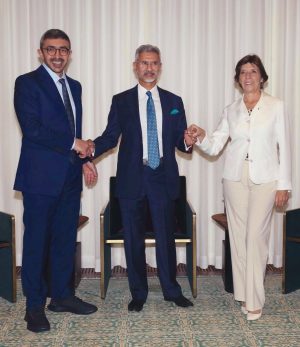India, France and the UAE held their first trilateral ministerial meetings on the sidelines of the 77th U.N. General Assembly session in New York last week. Among the prominent issues of discussion were deepening cooperation in the Indo-Pacific, with an emphasis on maritime security, regional infrastructure and connectivity, energy and food security as well as supply chain resilience. India’s External Affairs Minister Dr. S Jaishankar tweeted that “A productive first trilateral Ministerial meeting of India-UAE-France” took place, with an “active exchange of ideas between strategic partners and the UNSC members.”
The ministerial meeting comes against the backdrop of an earlier meeting in New Delhi in July 2022. On July 28, there was a trilateral meeting of the focal points of India, France and the UAE. The three sides were represented by senior representatives from their respective foreign ministries – Sandeep Chakravorty, joint secretary (Europe West) and Vipul, joint secretary (Gulf) from India; Bertrand Lortholary, director (Asia and Oceania) and Emmanuel Suquet, deputy director (Middle East and North Africa) from the French Ministry for Europe and Foreign Affairs; and Ahmed Burhaima, deputy director of the Economic and Trade Affairs Department of the UAE Foreign Ministry, who led the discussions. The three sides discussed maritime security, humanitarian assistance and disaster relief (HADR), blue economy, regional connectivity, cooperation in multilateral fora, energy and food security, innovation and startups, and supply chain resilience.
The latest meeting is significant for India’s growing participation in such minilateral groupings in addition to the obvious strategic benefits of partnering with France and the UAE. India is more comfortable in this format, as displayed by the number of such small exclusive engagements that India is now part of. On the sidelines of the U.N. session itself, India was part of several minilateral group meetings including Australia-India-Indonesia, and India-Australia-France trilaterals as well as the Quad Ministerial Meeting. In recent years, India is party to other forums including the I2U2 which involves India, Israel, the United Arab Emirates and the United States as well as India-Japan-U.S. and India-Japan-Italy trilaterals.
These minilaterals also become significant because India’s bilateral ties with each of these new security partners have been gaining strength, especially in the context of the rapidly changing Indo-Pacific strategic dynamics. While China’s rise and its strategic consequences may not be the direct or immediate focus of some of these groupings such as, for instance, the I2U2, bringing a wide variety of countries into the Indo-Pacific minilaterals appears to be an important aspect of India’s strategy for the Indo-Pacific.
Traditionally, India was wary of small exclusive group engagements but the intensification of major power politics and the worsening ties between India and China have pushed India to embrace new forms of diplomacy among like-minded strategic partners. India had earlier engaged in small groupings such as the India-Brazil-South Africa (IBSA), Russia-India-China (RIC), Brazil-Russia-India-China-South Africa (BRICS), Shanghai Cooperation Organization (SCO), South Asian Association for Regional Cooperation (SAARC), and BIMSTEC, though some of these groupings were regional groupings sharing common geography. But many of the newer groupings are more strategic in nature involving like-minded partners irrespective of geographical proximities of the countries involved. An Indian official who spoke to the media commented that “diplomacy is now changing and there are countries which are not neighbors or next to each other in a region but which have certain common interests and are working with each other.”
That France is among India’s closest strategic partners and an invested partner in the Indo-Pacific goes a long way in building up this trilateral. In recent years, France has often been spoken of in the same terms as Russia, standing shoulder to shoulder with India just as the Soviet Union, later Russia, did in the past. Both countries are maritime powers, with vast exclusive economic zones in the Indo-Pacific waters. The two also have growing interests in the maritime economy such as the blue economy, marine technology, fisheries, port and shipping, making their interests in ensuring a free and secure maritime order in the Indo-Pacific significant. Both have also articulated that these waters should remain a global common, with free flow of trade, with respect for international rules of the road. France-India relations are also one of the more comprehensive partnerships, spanning across strategic sectors including defense, space and nuclear domains.
Relations between India and the UAE have also evolved over the years. The number of high-level visits between the two countries is a testament to the deepening ties between the two countries. Since taking office, Prime Minister Modi has traveled to UAE four times, including this summer, on his way back from the G-7 meeting in Germany. Previously, Modi traveled to the UAE in August 2015, February 2018 and August 2019. Officials who spoke to the media commented that “things are moving very well on multiple fronts with the UAE, against the backdrop of Prime Minister Narendra Modi’s visit to the Gulf country in June this year and Jaishankar’s visit two weeks ago for the 14th India-UAE Joint Commission Meeting.”
Given the commonality of strategic interests and the strong bilateral ties, the India-France-UAE trilateral is likely to emerge as a strong pillar shaping the strategic dynamics in the Indo-Pacific. Last year, for the first time, the UAE joined India and France in their annual Varuna maritime exercise. The emerging partnership is likely to be a multifaceted one, with focus on defense and security including maritime security, and infrastructure and connectivity.

































